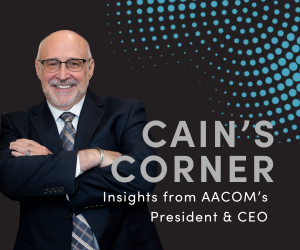Empathy with Its Sleeves Rolled Up: A Call to Compassionate Practice
Published June 04, 2025
By Robert A. Cain, DO
Cains Corner Inside OME
The past several weeks marked a joyful and momentous time in osteopathic medical education: commencement season. I have been honored and fortunate to attend and participate in several of these graduation ceremonies. Across the board, the talent, spirit and dedication of our graduates left me inspired. This is a group that will make us proud.
While speaking to our newest DO colleagues, I touched on points I kept top of mind during my practice that still help me today. As I told our graduates, we all earned the right to join a profession built not just on knowledge, but on service, responsibility and, last but certainly not least, trust. That's very important to remember, because one of the most powerful forces in medicine is trust.
A patient places their life in our hands—sometimes in the joy of birth, sometimes with fear of a terminal diagnosis and often with uncertainty. In those moments, they’re not just asking you for a diagnosis or a treatment plan. They’re silently pleading, “Will you listen to me? Will you see me as more than my illness? Can I trust you?”
In recent years, that trust has been tested like never before. By complexity, by inequity, by historic pandemics, by deliberate attack and by moments when the system seemed to forget its purpose. But here’s the good news: each of us in this profession is uniquely equipped to help rebuild trust in medicine.
We’ve chosen a professional degree that was founded on seeing people differently. Every DO trained in a tradition teaching that healing happens beyond procedures or prescriptions. Healing happens when compassion walks into the room.
It's worth examining the word compassion for a moment. We often use it interchangeably with empathy, but they’re not the same. Empathy is the ability to feel with someone. Compassion is when that feeling moves you to act.
As physicians, it’s not enough to understand suffering. Our job is to step toward it—with skill, humility and purpose. Compassion is empathy with its sleeves rolled up.
This is where osteopathic education shines. We learn to treat the whole person. To pay attention to structure and function, yes—but also to listen deeply, to notice what isn’t being said and to understand the context in which illness occurs. DOs are trained to ask not just, “What’s the matter?” but also, “What matters to you?”
That question, asked sincerely and often, can restore relationships, renew trust and improve outcomes. It’s not just good medicine. It’s great medicine.
Our graduates are joining a profession that is evolving; becoming more diverse, more team-based and more focused on value and outcomes. And yet, even as everything changes, the heart of medicine stays the same: one human choosing to care for another.
And that is what our patients need most from us. Not our "infallible" knowledge and perfection, but our compassion and our presence. Our ability to show up with wisdom, integrity and compassion is what will define us far more than any test score or credential ever could.
To all our graduates, I offer my congratulations and a reminder that you are part of something bigger. A legacy that began in rural Missouri with Andrew Taylor Still. A vision that medicine could be more human, more connected and more healing. That vision lives on inside every DO and now, in you, too.

Robert A. Cain, DO
AACOM President and CEO

